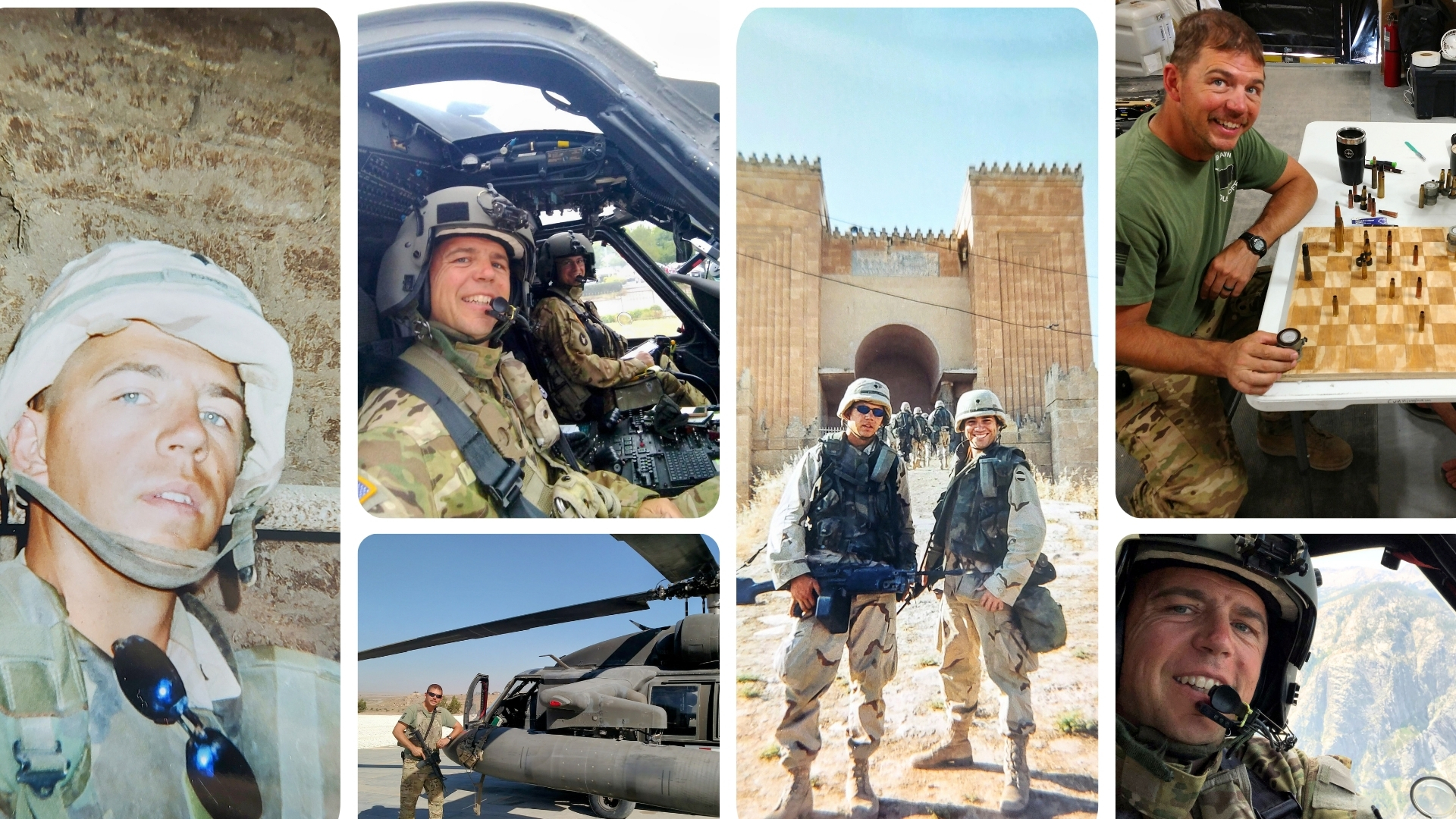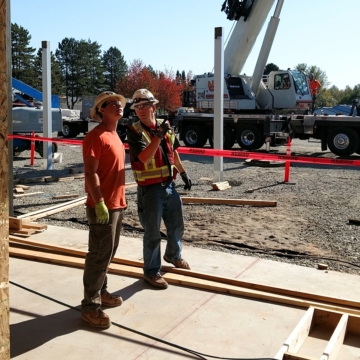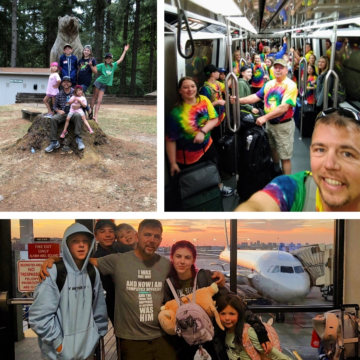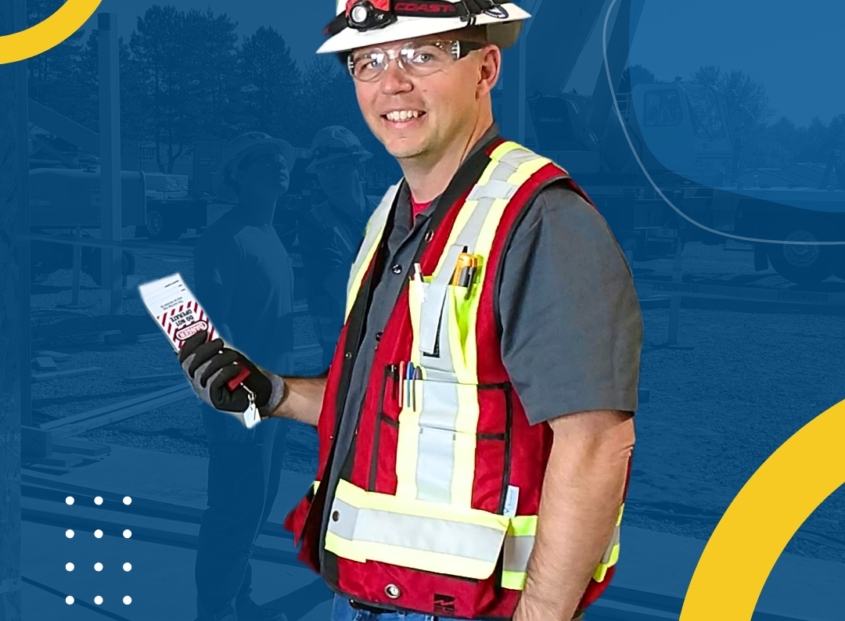Member Spotlight: Steve Huson, Safety Coordinator at Mill Plain Electric
At Mill Plain Electric, safety isn’t just a priority—it’s a core value that drives everything they do. Leading the charge in safety is Steve Huson, the company’s Safety Coordinator. A true servant leader, Steve’s approach to safety is simple but powerful: take it “the last 18 inches”—from the head to the heart. His goal is clear: to get everyone home safe, healthy, and happy every day.
With over 22 years of experience in the military, including as a maintenance test pilot, along with expertise in heavy equipment operation, engineering, construction, and machining, Steve brings a well-rounded and disciplined perspective to his role. He is committed to continuous improvement, striving every day to make today better than yesterday for his family, his co-workers, and his friends.
Join us as we dive into Steve’s journey, where his military experience and electrical expertise seamlessly intersect. His ability to navigate complex situations, lead teams, and ensure the safety of everyone on the job site is deeply rooted in his time in the military, where attention to detail and quick decision-making were paramount. Steve’s transition from military service to the electrical trades showcases how these two worlds complement each other, shaping his approach to leadership and safety in the workplace.
How long have you been a member of IBEW Local 48?
I’ve been a member for about 19 years now. I’ve been an electrician for 24, but I joined the IBEW when I decided to make the switch. Before that, I was working as a machinist at Columbia Engineering Works. I remember watching the electricians on the job, thinking, ‘Those guys are making a lot more money than I am and they don’t seem to be working as hard!’ One of the machinists I worked with ended up applying to the union, and when he came back and told me about it, I thought, ‘Okay, it’s my turn!’ So, I went ahead and applied myself.
Can you tell us about your role in the military? What was your MOS?
I served for 22 years in the Oregon Army National Guard, beginning at the age of 23. My military experience shaped who I am today and played a big role in preparing me for leadership roles in the civilian workforce.
I started my career with the Corps of Engineers, where I spent the first 10 years working as an Electrician (21R). This role involved maintaining electrical systems and providing support for various construction projects. After a few years, I transitioned into a position as a Construction Supervisor (21H), overseeing construction operations and ensuring that everything ran smoothly. I gained a lot of hands-on experience during these years, learning the ins and outs of project management and the importance of teamwork and precision in everything we did.
After my time in the Corps of Engineers, I spent the last 12 years of my military career with the C 7-158th Medical Evacuation (MEDEVA) unit out of Salem, Oregon. As a MEDEVAC pilot in command and maintenance test pilot (153MG), my primary role was to support medical evacuations, ensuring that the unit’s aircraft were operational and safe for use. It was a high-pressure environment, and my job required quick thinking and precise decision-making, especially in critical situations. I loved the challenge, and the responsibility of knowing lives could depend on the work I was doing.
“General Dwight D. Eisenhower, who led the Allied Forces in Europe during World War II, famously said, “In preparing for battle I have always found that plans are useless, but planning is indispensable.”
Looking back, I can see how my military experiences helped me develop the skills that would later make me a better leader in the civilian workforce. Whether managing complex projects, working with diverse teams, or making tough decisions under pressure, the leadership lessons I learned in the Oregon Army National Guard were invaluable in preparing me for the challenges I faced in the civilian world.

Could you share your deployment timeline and how it overlapped with your time as an IBEW member?
My first deployment was from 2003 to 2004, when I spent 14 months in Iraq with the engineers. At that time, I was an electrician. My second deployment was from 2013 to 2014 in Kosovo. And my third was from 2017 to 2018 in Syria.
How does IBEW accommodate members who are deployed?
When you get deployed, you go on leave, but you still accrue points for retirement. So, when you come back, you pick up right where you left off—you get all your pay, raises, and everything that happened while you were gone. It’s a great system that makes the transition back pretty seamless.
Did being an IBEW member influence your service or vice versa?
It really worked both ways. I went into the military as an electrician, which made it easier to get into the apprenticeship when I came back. I think the IBEW looks at the military and sees that we already have the discipline to show up on time and we know what hard work looks like.
In the military, I was able to do a lot of electrical work. I did electrical work in Germany for a few weeks, then in Kosovo, I handled electrical needs for our unit. Even in Iraq, I was involved with electrical projects. In my last, I even had the chance to volunteer some of my off time to help an orphanage with their electrical work. That was a pretty cool experience.
I also want to highlight how supportive IBEW was while I was deployed. They reached out and made the transition in and out super easy. They were really flexible with the demands that the military places on service members, and that made all the difference.
“I would say the biggest lesson that I learned in the military that has helped me in the IBEW is trusting other people to do what they’re supposed to do and being open to other ideas that may be very different than anything I ever thought – but often times, even better.”
What are your responsibilities as a Safety Coordinator?
As a Safety Coordinator, my job is to assess the jobs we’re doing, the locations, and the hazards associated with each task. My first goal is always to eliminate the hazard if possible. If I can’t eliminate it, then I look at ways to substitute the methods or equipment we’re using. We put policies in place to help mitigate risks, and if the policies alone aren’t enough, we implement additional safety measures, like PPE.
My focus is on taking safety the last 18 inches—because most people in the industry already know the right thing to do. That last 18 inches is the difference between knowing and doing. If safety isn’t a core value or priority, it’s easy to cut corners, and that’s when accidents happen. My role is to make sure safety isn’t just a rule but a mindset, a core value.
Another part of my role is training. I handle all of our new hire training and situational awareness training. I pull a lot from my military experience because, to me, a construction site is somewhat like a combat zone—just without the guns. There are things on the job that can kill you quickly, and being aware of your surroundings is paramount.
“The military taught me to make that awareness second nature, and I’m here to pass that on to the crew. I want to help everyone who comes in and out of the site understand what they need to do to stay safe and be successful.”
What mindset or values from your military experience do you bring to your work in the electrical field?
One story that really stands out for me was when I was a very young soldier, only a couple of years into the service. I was heading to annual training when my platoon sergeant—an E6—called me up and said, ‘Hey, by the way, I’m not going to be there. You’re in charge.’ I was both irritated and humbled at the same time. When I arrived, I met with the commander and the first sergeant, and they just said, ‘Yep, this is all you.’
At first, I was confused because I wasn’t the highest-ranking person there, and I definitely hadn’t been in the longest. But over the course of the week, they kept adding more and more responsibility. They handed me a set of plans for a big project—a wooden bridge through the wetlands in Seaside, with an observation deck on the dunes. It was a cool project, but they also gave me a material list and said, ‘We need this, we need that.’ And I thought, ‘Okay, I’ve got this.’
I stayed up until 3 a.m. every night trying to get everything figured out, knowing first formation was at 5:30 a.m. The next day, they’d add more to my plate, and I kept pushing through, thinking I could handle it. After four days, I finally walked into the commander’s office, threw my Kevlar down on the desk, and said, ‘This is BS—there’s no way anyone can do all of this.’
The commander and the first sergeant just smiled at each other. Then the commander said, ‘Well, it took you a little longer than we expected, but we were waiting for you to figure that out.’ He went on to say, ‘You have to learn to delegate. You can’t do it all yourself. You need to trust your team to take some of the tasks off your plate.”
That moment was a turning point for me. I realized that leadership wasn’t about doing it all yourself—it was about trusting your team, understanding the bigger picture, and knowing how to communicate that vision clearly. I learned that to be an effective leader, you need to delegate, share responsibility, and help your team see how their individual contributions fit into the larger mission. A good leader encourages and empowers others and tries to leave those they interact with better equipped for life’s challenges. This was a lesson I carried with me through the rest of my military career and into my civilian life.
During his time with the Oregon Air National Guard in 2018, Steve Huson participated in a rescue operation to save Sarah Rask, who had fallen and injured herself on Broken Top Mountain in central Oregon. The Blackhawk helicopter crew lifted her to safety.
Want to share any times you had to really think outside the box on a job?
Thinking outside the box is one of my favorite things. OSHA sets minimum standards, but those are based on an ideal world—and we don’t live in an ideal world. If I can prove that what we’re doing is just as safe, or even safer, than what the regulation says, then I’m going to make it work.
One of my favorite projects was reworking the Lewis and Clark Bridge near Longview. We had to come up with a system to keep the crew safe while working several hundred feet above the water. We made sure there was a rescue boat on standby, provided self-inflating life jackets, and implemented safety measures to protect them if they fell into the water. We also developed a way for them to safely work outside the guardrails to replace piping. It was all about creating a system that kept the team safe while getting the job done efficiently.
How do you approach safety in your work and within the industry?
At Mill Plain, safety is like a core value. We’re all working together, and the goal is always to keep each other safe. It’s not about keeping secrets or trying to outdo each other with ‘cool’ new safety tricks—safety isn’t competitive. If someone finds something that makes the job safer, we share that information with the whole team, and with the industry.
It’s the same within the NECA group I belong to as well. We meet every month to share tips and lessons learned. We talk about the struggles we’re having and find ways to improve. Safety is something we all need to be invested in because, while one person may work with us on a job, they may move on to another contractor when the job is done. If we all take the time to train everyone and make safety a top priority, it benefits everyone in the long run. We’re all connected in that way, and it’s about sharing knowledge to keep each other safe, no matter where we are or who we work for.
About Steve Huson
Beyond his impressive professional experience, Steve is also a proud father of five children, embodying the values of leadership, responsibility, and care both at work and at home. He volunteers for the NECA-IBEW ambassador outreach program and works with pre-K through 5th grade students at GSCC. His servant leadership style is about supporting others to ensure that everyone is safe and successful in their work.
Connect with Steve on LinkedIn.
The NECA/IBEW Local 48 Partnership
The partnership between the Oregon-Columbia Chapter of NECA and IBEW Local 48 is driving the electrical industry forward with a strong commitment to integrity, quality, safety, and professional excellence. Together, we’re setting the standard for innovation and craftsmanship in every project. If you’re interested in learning more, visit our membership page.



